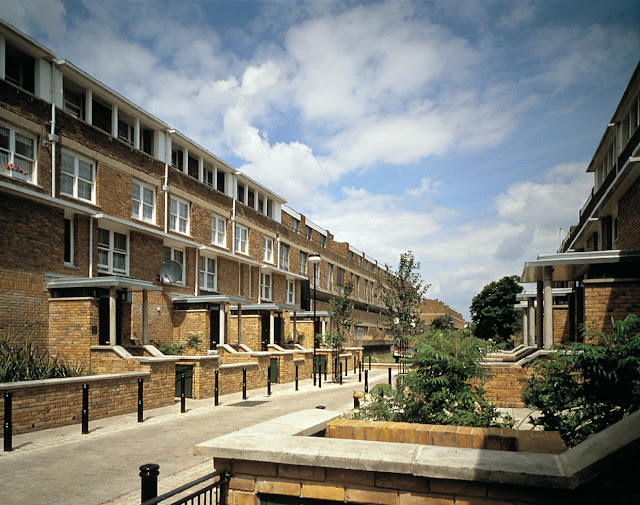The Angell Town project is a pilot scheme in Brixton, South London, which addresses the design and management problems typical of a 1970s deck-access estate. The initiative to improve the environment of what had become a ‘sink estate’ came initially from the tenants, who were very keen to make sure that the proposals by the London Borough of Lambeth were tailored to the needs and desires of people of the estate. In 1988 three projects were initiated; a Workspace Project using derelict ground-level garages; an Enterprise Centre for training and employment opportunities and a Pilot Project to replan the deck-access housing.
 |
| Before |
 |
| After |
The urban design objectives were to reintegrate the estate with the surrounding areas of Brixton by re-establishing a street based urban layout; to establish an active public realm at ground level; to establish a hierarchy of public and private space; to de-industrialise the estate; to create clear, safe routes for people who use and live on the estate and to solve a variety of related problems to do with security, refuse collection, dangerous parking and traffic, and the general hostility of the surroundings.
The project won many awards including Community Initiative Award 1983, 1985, 1987, 1990, 1991, Times/RIBA Community Enterprise Award 1989, Civic Trust Award 1990, and The Communities Projects Foundation Award for Partnership.
 |
| Before |
 |
| After |
In 2008 the ongoing success of the project was acknowledged by Baroness Whitaker in the House of Lords. “ A few weeks ago I saw in Angell Town in Brixton the rehabilitation of exactly one of those estates, accompanied by new building, which created attractive, safe and affordable homes within a strong community, steered by residents’ own wishes. Nearly three-quarters of them said that they now felt safe, that they were satisfied with their new homes and that Angell Town was now a pleasant, friendly and attractive place to live. A few years ago, half knew a victim of crime and it was a deeply unpopular place to live.”




blog.jpg)